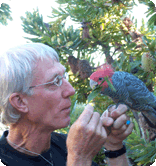Overweight Amazon Parrot

Hi Eb, I have been a WPT member for well over 20 years and have an urgent question: My Panama Amazon was recently ill and very nearly died.. She had stopped eating and had to be fed with a tube. She was in the care of our Avian Vet who, like myself, did not realize that she is obese. The Avian specialist who read her blood results and her xRay said it was probably her liver due to obesity. (She weighed 520 grams). I was told to feed her ANYTHING she would eat and eventually, she did begin eating again. She has been raised on a diet of Harrison's pellets plus fruits and vegetables. She is 17 years old. I found that the weight for a Panama Amazon is normally 480 grams. I ordered an avian scale and began feeding her a diet of phytonutrients as recommended by David McCluggage, DVM (on the web) who maintains that amazons should NOT be fed mostly pellets. I was shocked when the scale arrived and she weighed 615 grams! She has been on this super healthy diet for a month now, with only one or two pellets a day and one "NutraBerry" seed treat.
But, AND HERE IS MY DILEMMA/QUESTION: She has NOT lost weight. She weighs around 630 grams. She does get some exercise as she is outdoors in a large macaw cage during the day. I don't know how I can get her to exercise more. I try with interactive toys, etc. She chews a lot and sings opera!! I am terrified she will become ill again if she doesn't lose weight.
PLEASE ADVISE: I can't find any answers online after endless searching. Thank you so very much for taking the time to ready this lengthy question/explanation. I am so very, very grateful!
Thanks,
Linda

Dear Linda, I hope that your Panama (You did not mention a name) is stable and eating properly. In cases such as these I would prescribe a full sprouts diet plus added items.
Now this need not be fully sprouted seeds, but can be germinated seeds--that is, twenty-four to forty-eight hours of soaking with many rinses during the day, and then feed the following. Take her off the pellets and foods she has been eating but add a certain amount of dried seed to the sprouts mix, such as canary seed, red proso millet, hemp. Our favorite sprouting seeds are mung beans, safflower, organic buckwheat from the health food store, and organic sunflower from the health food store. Also good quality spray millet will sprout overnight...Do not worry about the sunflower being too fattening as when sprouted and fed in mixed amounts with other grains, it has many more benifts for the parrot.
In addition, birds that overeat are often seeking micro ingredients in their diet that they are not receiving through processed foods and veggies and fruits. I would recommend a supplement from China Prairie Co. (online in Northern California) called Micracine Enhance which is both an avian probiotic and a montmorillonite clay base. It will provide trace minerals and digestive aids. There are of course other vitamin mineral supplements that are good and you could use if you prefer.
Now if you are dealing with fatty liver, you should begin to mix up herbal milk thistle into a tea and substitute it for the water in your parrot's bowl at leat four times a week if not regularly. It does not taste bad to parrots and it will slowly begin to heal damaged liver tissue. We also like to give sprinklings of spirulina on food to birds with immune problems fighting any health problem. Especially if they are not big vegetable eaters.
Vegetable stems are the best, chard, carrot, beet, watercress, celery, etc. You can grate them to release juices on the foodstuffs if your bird throws the pieces out of the bowl.
Fruit pips are a wonderful way to get natural and not fattening items into an amazon diet. papaya, pomegranate, melon, kiwi, guava, fig, passion fruit, anything that has ripe seeds in it that are raw. Snap peas and beans are great. If you make feeding an adventure and supplement it with an almond, walnut or two, your amazon will not go hungry and will soon transform her dietary choices into a greener, less habitual fattening diet. It may take up to three months. Drop the nutriberries as they are sweetened. If your bird likes smoothies or protein shakes, that is a good way to supplement feed as liquid foods absorb quickly and free up the liver to begin to cleanse itself. I have had amazons that like to think they were lories!!!
Please feel free to contact me at my email if you wish further consultation. These cases are complex and not all that easy to solve from afar.
Be well and good luck,
EB Cravens

































